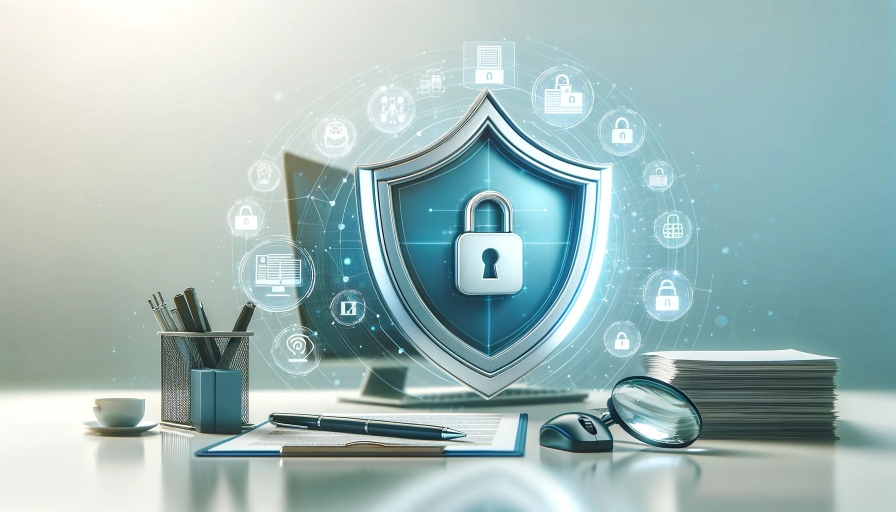Direct validation services can be crucial in helping with fraud prevention. These services, designed to verify the authenticity and accuracy of various data, can help businesses identify and prevent fraudulent activities. By utilizing identity verification, address validation, phone number validation, email validation, IP geolocation, device fingerprinting, and transaction monitoring, businesses can ensure their customers’ legitimacy and transactions, thereby enhancing the effectiveness of “Direct Validation Services Help in Fraud” strategies.
Direct validation services act as a protective shield, allowing businesses to detect and mitigate potential risks before they cause any harm. So, if you want to safeguard your business from fraud, direct validation services are a valuable tool to consider.
Identity Verification
To verify your customers’ identities and prevent fraud, direct validation services offer efficient and reliable solutions. One of the critical methods used in identity verification is biometric authentication. This involves analyzing unique physical or behavioral characteristics, such as fingerprints, facial features, or voice patterns, to confirm a person’s identity. Biometric authentication is highly accurate and difficult to forge, making it a robust tool for preventing fraudulent activities.
Another essential aspect of identity verification is document verification. Direct validation services use advanced technology to scan and analyze various identification documents, such as passports or driver’s licenses, to ensure authenticity. By comparing the information on the document with external databases or applying optical character recognition (OCR) technology, these services can quickly and accurately verify the identity of individuals.
By employing biometric authentication and document verification, direct validation services provide a comprehensive approach to identity verification, significantly reducing the risk of fraud. These methods enhance security and streamline the verification process, saving time and resources for businesses.
Let’s explore the next section on ‘address validation’ and how it further strengthens fraud prevention measures.
Address Validation
With address validation, you can further enhance fraud prevention measures by ensuring the accuracy and legitimacy of your customers’ addresses. Address validation involves using geocoding accuracy to verify the authenticity of the address provided by the customer. By confirming the address, you can reduce the risk of fraudulent activities such as identity theft and shipping fraud.
Geocoding accuracy refers to converting an address into geographical coordinates, such as latitude and longitude. This allows you to pinpoint the exact location of the address and validate its existence. By comparing the provided address with the geocoded data, you can detect discrepancies or inconsistencies that may indicate fraudulent behavior.
Address validation also plays a crucial role in geolocation fraud prevention. Geolocation fraud involves using false or manipulated location information to deceive businesses and carry out fraudulent activities. By verifying the accuracy of the customer’s address, you can ensure that they are indeed located where they claim to be. This helps in preventing fraudulent transactions and protecting your business from financial losses.
Phone Number Validation
Phone number validation is crucial in preventing fraud by preventing fake phone numbers. By verifying the authenticity of phone numbers, businesses can ensure that their customer data is accurate and reliable. This helps maintain the integrity of their databases and enables them to make informed decisions based on accurate information.
Preventing Fake Phone Numbers
Ensure the authenticity of phone numbers and prevent fraud by utilizing direct validation services. Fraudsters can use fake phone numbers to carry out various illegal activities, such as identity theft, phishing, and spamming. Phone number verification plays a crucial role in fraud detection as it allows organizations to confirm the legitimacy of the numbers provided by their customers or users.
By implementing direct validation services, businesses can instantly validate phone numbers and identify potential red flags, such as non-existent or inactive numbers, numbers associated with known fraudsters, or numbers from high-risk regions. This proactive approach helps prevent fraudulent activities before they can cause any harm. By incorporating phone number validation into their fraud prevention strategies, organizations can enhance their security measures and protect themselves and their customers from falling victim to phone-related scams.
Enhancing Data Accuracy
Improve the accuracy of your data by implementing direct validation services for phone numbers. Phone number validation is crucial in enhancing data accuracy and reducing errors. You can validate phone numbers to ensure your information is correct and up-to-date. This helps improve data quality and prevent errors in your database. Direct validation services use algorithms and databases to verify the validity of phone numbers, checking for correct formatting, existence, and active status.
By identifying and eliminating fake or incorrect phone numbers, you can reduce the chances of data errors and ensure that your data is reliable and trustworthy. Implementing phone number validation as part of your data validation process is a proactive step toward maintaining accurate and error-free data.
Email Validation
You can use email validation to verify the authenticity of email addresses and reduce the risk of fraud. Email deliverability and spam filtering are critical factors in ensuring your emails reach the intended recipients and avoid being marked as spam. By validating email addresses, you can ensure that your messages are being sent to legitimate email accounts, improving email deliverability and reducing the chances of your emails being filtered out as spam.
Email validation helps to identify and eliminate invalid or fake email addresses from your mailing list. It checks an email address’s syntax, format, and domain to verify its legitimacy. By removing invalid or fake email addresses, you can improve the accuracy and effectiveness of your email campaigns, ensuring that your messages reach genuine recipients who are more likely to engage with your content.
In addition to reducing the risk of fraud, email validation helps maintain a high sender reputation. When your emails consistently reach valid recipients, your sender’s reputation improves, increasing the likelihood of your future emails being delivered to the inbox rather than the spam folder.
As we discuss IP geolocation, it’s important to note that email validation is just one aspect of fraud prevention that can be enhanced through direct validation services.
IP Geolocation
To enhance fraud prevention, incorporating IP geolocation can provide valuable insights into the geographical origin of online activities. IP geolocation refers to the process of determining the physical location of an IP address. Businesses can identify potential fraudulent activities by analyzing the geolocation data and take appropriate actions.
One key benefit of IP geolocation is its accuracy. Geolocation databases are constantly updated and improved, resulting in more precise location information. This accuracy allows businesses to pinpoint the origin of online activities with greater certainty, enabling them to detect and prevent fraud more effectively.
IP geolocation also plays a crucial role in location-based fraud prevention. Businesses can identify suspicious activities by comparing the geolocation of an IP address with the user’s stated location. For example, if a user claims to be located in one country but their IP address indicates a different location, it could be a red flag for potential fraud.
Additionally, IP geolocation can be integrated into fraud prevention systems to create rules and triggers based on location data. This allows businesses to automatically flag or block transactions originating from high-risk areas, reducing the risk of fraud.
Device Fingerprinting
Device fingerprinting is a powerful tool in fraud prevention that involves uncovering unique device identifiers and detecting suspicious device behavior. By analyzing factors such as device type, operating system, browser version, and installed plugins, device fingerprinting creates a unique profile for each device, making it easier to identify potential fraudulent activity. This technique helps businesses validate the authenticity of devices and detect any anomalies that may indicate fraudulent behavior, enhancing their overall fraud prevention efforts.
Uncovering Unique Device Identifiers
Through advanced technology, fraud prevention experts can uncover unique device identifiers by analyzing the digital fingerprints left behind during online transactions. Device identification plays a crucial role in fraud detection as it helps identify and track devices used by potential fraudsters. Experts can create a unique device fingerprint by analyzing various attributes, such as its IP address, operating system, browser type, and screen resolution.
This fingerprint can then identify and flag suspicious activities across multiple transactions. Uncovering these unique device identifiers enables fraud prevention systems to detect and prevent fraudulent activities more effectively. By continuously monitoring and analyzing device fingerprints, organizations can stay one step ahead of fraudsters and protect themselves and their customers from financial losses.
Detecting Suspicious Device Behavior
When analyzing suspicious device behavior, you can detect potential fraud by examining the unique fingerprints left behind during online transactions. Device fingerprinting involves capturing various attributes of a device, such as IP address, browser type, operating system, and screen resolution, to create a unique identifier. By comparing these fingerprints across multiple transactions, you can identify patterns and anomalies that may indicate fraudulent activity.
Machine learning algorithms play a crucial role in this process, as they can analyze large amounts of data and detect subtle behavioral patterns that humans might miss. Behavioral analysis is another critical component, as it helps identify deviations from normal user behavior, such as unusual browsing patterns or transaction velocity. By combining machine learning algorithms and behavioral analysis, direct validation services can detect and prevent fraudulent activity by identifying suspicious device behavior.
Transaction Monitoring
You can rely on direct validation services to monitor transactions and prevent fraud. Transaction monitoring is a crucial step in identifying and mitigating fraudulent activities. By employing machine learning algorithms, direct validation services can detect suspicious patterns and anomalies in transaction data, helping to identify potential fraud cases.
Machine learning algorithms analyze large volumes of transaction data in real time, comparing it against historical patterns and known fraud indicators. This allows direct validation services to identify abnormal transaction behavior, such as huge transactions, multiple transactions from the same device within a short period, or transactions that deviate significantly from a customer’s typical spending habits.
Direct validation services can promptly identify and flag potentially fraudulent activities by continuously monitoring transactions. This enables businesses to take immediate action to prevent financial losses and protect their customers’ sensitive information.
Moreover, direct validation services can also provide valuable insights into the effectiveness of existing fraud prevention measures. Businesses can optimize their fraud prevention strategies and enhance security by analyzing transaction data and identifying patterns and trends.
Frequently Asked Questions
What Are the Different Types of Fraud That Direct Validation Services Help in Fraud Prevention?
Direct validation services can help prevent fraud, such as identity theft, credit card fraud, and account takeovers. By verifying information in real-time, these services provide an added layer of protection and enhance fraud prevention measures.
How Do Direct Validation Services Ensure the Accuracy of Identity Verification?
Direct validation services ensure identity verification accuracy by cross-referencing multiple sources, like allegorical detectives piecing together clues. This meticulous process benefits fraud prevention by eliminating false identities and safeguarding against fraudulent activities.
Can Direct Validation Services Detect and Prevent Fraudulent Activities in Real-Time?
Direct validation services can detect and prevent fraudulent activities in real-time, allowing you to safeguard against potential risks proactively. Stay one step ahead and protect your business with this valuable tool.
Are Direct Validation Services Compatible With Different Types of Businesses and Industries?
Are direct validation services compatible with different types of businesses and industries? Yes, they are. With scalability concerns and cost-effectiveness analysis, direct validation services can be tailored to meet the specific needs of any business or industry.
What Are the Potential Challenges or Limitations of Using Direct Validation Services to Help in Fraud Prevention?
Challenges and limitations of using direct validation services for fraud prevention include potential false positives, limited coverage for specific industries, and the need for ongoing updates to stay ahead of evolving fraud techniques.




